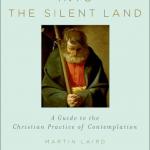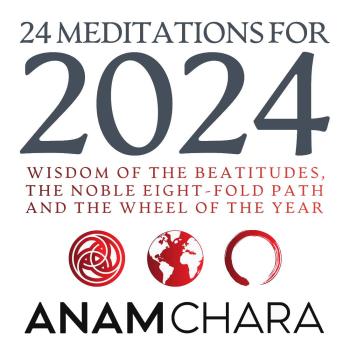How do we embody the contemplative life? And how does the contemplative life make a difference in our bodies (both as individuals and collectively)?
 Fran and I had dinner the other night with a charming couple named Ray and Lee. We had met Ray a few weeks earlier when I spoke at a UU Church here in Atlanta; like so many spiritual seekers of our time, Ray has been a wanderer, setting forth from his conservative Protestant upbringing to explore eastern spiritual paths such as Tibetan Buddhism and Taoism. Now in midlife, he has connected with Lee, a lifelong Christian who shares his deep and intentional spirituality but who hasn’t been such an interfaith explorer. For them, the meeting-place has been — of course — the Christian mystical and contemplative tradition.
Fran and I had dinner the other night with a charming couple named Ray and Lee. We had met Ray a few weeks earlier when I spoke at a UU Church here in Atlanta; like so many spiritual seekers of our time, Ray has been a wanderer, setting forth from his conservative Protestant upbringing to explore eastern spiritual paths such as Tibetan Buddhism and Taoism. Now in midlife, he has connected with Lee, a lifelong Christian who shares his deep and intentional spirituality but who hasn’t been such an interfaith explorer. For them, the meeting-place has been — of course — the Christian mystical and contemplative tradition.
For most of the evening we talked about how lovely it is to integrate spiritual depth with at least an open heart toward wisdom found throughout the world’s great traditions. But toward the end of the evening, Ray spoke movingly about how Taoist medicine helped him through a health crisis a few years back, when western doctors seemed at a loss to provide meaningful treatment. As he told his story, Ray noted how the spirituality of the west seems so disconnected from the body. “It’s like everything takes place from the head up,” he said.
I sighed in agreement. “So much of the western tradition has been built around strategies for dealing with our unruly minds,” I said, thinking of the Desert Mothers and Fathers who struggled against the logismoi, or the “afflictive thoughts” of pride, avarice, lust, and so forth (this led to the formulation of the “seven deadly sins” but to the Desert dwellers, the thoughts were seen as a nuisance even before they became sinful). The problem with the afflictive thoughts had to do with their “stickiness” — it’s easy to get hung up on thoughts about material possessions, or strong emotions, or burning desire, which tends to choke off the kind of serenity and inner balance that allows contemplation to thrive.
“So we move from our thoughts, which tend to be chaotic and unruly, into our hearts, which are marked by spacious silence,” I remarked. “Exactly,” said Ray, “but in the west we never take it deeper than that.”
It was an interesting insight. What is deeper than the open silence of our hearts? Traditional Christian spirituality would probably say, “only God is deeper.” But where is it we are finding God, anyway? And what about the human body? The body holds the silence of the heart, in the same way that the heart holds the incessant chatter of the mind. Our bodies are like chalices, meant to receive the precious presence of God the way that a Eucharistic chalice receives the precious blood of Christ, wine consecrated in the Mass. But how do we pray the body? How does our spirituality foster its healing? How does embracing the silence of the heart strengthen us to more fully respond to the love of God: not just as a thought we think, but as an embodied reality we live?
“The problem with our Christian wisdom regarding theosis or deification is that we approach it through a western rationalistic lens: it has become a thought we think, or an idea we imagine, rather than a reality we incarnate,” I admitted to Ray.
This has become a part of my daily prayer. How do we, as Christians, bring our prayer, our contemplation, our spirituality into our bodies? What would that look like? What difference would it make? How would it impact our health and our wellness? And perhaps most important of all — since Christianity is a communal, social faith — how would that make a difference to the larger Body of Christ — i.e., the Church, the community of faith?
I have no snappy answers to these questions. Rather, I’m posting this here for you, readers of this blog, to ponder these questions with me. As we pray, as we read the writings of great mystics past and present, and as we explore interfaith wisdom as a way to deepen our own faith in Christ, let’s hold these questions in our hearts and minds. Perhaps the Holy Spirit is calling us in the third millennium to generate a truly incarnational, embodied, holistic/nondual mysticism, that lives as much in our flesh and bones as in our minds and thoughts.
Enjoy reading this blog?
Click here to become a patron.














